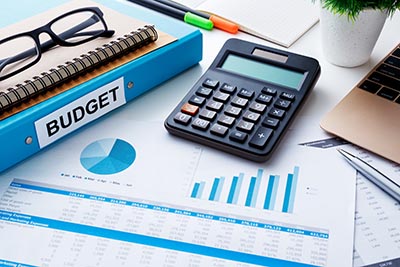
If you want to make a big purchase, your credit score is extremely relevant.
For example, maybe you’re ready to sell your old car and get a new one, or even buy a house. It’s unlikely you’re going to fully make these big purchases with cash. Instead, you may get a loan.
A lender will want to see that you’re likely to repay that loan on time and as agreed to.
One of their best indicators, as they determine whether or not you’re a good borrower, will be your credit score and your credit history.
Unfortunately, if you don’t have much credit history or you have negative things on your report, it can hold you back from making big purchases and potentially moving forward in your life.
Below is a guide to what you should know to build or rebuild your credit in a manageable, effective way, no matter your current financial situation.
What is a credit score?
Your credit score is a three-digit number lenders and other third parties use to determine how risky it would be to lend you money. Credit companies, banks, and other financial institutions use your score to assess how likely you are to repay a debt. If you have a higher credit score, it shows that you’re in a stronger financial situation, and you have a history of behavior that makes you safer to lend to.
The most commonly used credit scoring system in the U.S. is the FICO score. Major credit agencies use FICO scores to determine creditworthiness.
Your FICO score can range between 300 and 850. Poor credit is anyone with a FICO score under 580.
Fair credit is usually viewed as a score between 580 and 669, and good credit is between 670 and 739.
A very good credit score is between 740 and 799. Excellent credit is anything above 800.
You don’t just have one credit score, which is surprising to a lot of people. Instead, your credit score can vary depending on the company that provides it and the data that the company uses in its calculation.
The impact of your credit score
The first way your credit score affects you financially is because it’s used to determine whether or not you’re approved for something like a credit card or loan in the first place. The second way it affects you is by helping lenders determine the interest rate you pay if you’re approved.
The higher your FICO score, the more likely you are to be approved and the lower your interest rate is expected to be.
With a low FICO score, even if you are approved, you may have a very high interest rate.
The calculation of your credit score
Before you can start to rebuild credit, you need to have an idea of how your score is calculated. This will help you see where to focus your efforts.
The following are the main factors used to calculate your credit score.
Payment history
Your history of on-time payments makes up the most substantial chunk of your credit score calculation. Your payment history is what shows a potential lender that you are reliable and you’ll make on-time payments to them.
You are penalized when you don’t make on-time payments. If you have a history of late or missed payments, a lender might think you’re going to have the same problem with them.
If you want to get a loan, it’s crucial to have a solid repayment history.
Even just being a little late on a payment can harm your credit score. How much of an impact late payments have depends on how late you were. These late payments can be divided into 30-day and 60-day categories, for example.
It could be an accident that you missed a payment simply because you forgot, but it can dramatically and negatively affect your score. It doesn’t have to be a big payment to ding your credit significantly.
How much debt you have
In calculating your credit score, consideration is given to how much debt you currently owe and how it’s broken up.
Having a lot of debt doesn’t inherently mean a lower credit score, though. You could have a lot of debt but always make your payments on time. That would show you can handle your financial obligations easily.
Credit utilization
Credit utilization is another major factor that plays into your credit score. This can also be described as your debt-to-limit ratio.
Basically, this is a measure of the total amount you have on your credit card accounts versus your limit on each. The lower your credit utilization, the better. It’s going to negatively affect your credit score if you’re maxing out all the credit available to you, even if you’re making payments on time.
Length of credit history
It’s good to have aged accounts on your credit report. When you have a more extended credit history, it shows more comprehensively how creditworthy you are. The older your accounts and your general credit history, the better.
If you have a card you don’t use anymore, don’t cancel it. You have to think about how that will affect the average age of your credit history.
The types of credit you have
While it’s not as important as the factors above, the calculation of your credit score also considers the types of credit or debt you use. Lenders often want to see a nice mix of installment loans, like a car loan, revolving credit such as a credit card, and consumer finances.
Inquiries
When someone pulls your credit report, it can be a hard inquiry. Hard inquiries are the number of times lenders have requested your data. The higher the number of hard inquiries, the more it might cause your score to decrease.
Steps to improve your credit
You may have bad credit, or you might not have any credit. Either way, there are things you can start doing right now to improve the situation, particularly if you plan to make a big purchase in the near future.
Check for errors
The first thing you should do is make sure your credit report doesn’t have errors. You should do this every few months. People are often surprised by how frequently errors pop up on credit reports.
You’re entitled to a free copy of your credit report from each of the three major credit bureaus every year. Take advantage of this and go over the information carefully. Ensure there aren’t any amounts, addresses, or accounts on there you don’t recognize.
If there are, open a dispute with the credit bureau to remove it.
Pay on time
The most important thing you can do for your financial future and secure a strong credit score is to pay your bills and all of your current lines of credit on time. Even if you’re paying just the minimum, that’s okay.
For some people, being disorganized and having too many accounts is the problem. Create a simple spreadsheet or some way to track all of your payments and their due dates so you don’t inadvertently fall behind.
If you have bills already in collections, prioritize paying the currently open accounts.
Debt collectors can be an annoyance, but your priority needs to be staying current on your open accounts if you want to improve your credit.
Keep your credit available
Credit utilization is, again, the percentage of your credit limit you’re using. Along with paying on time, keeping this low is extremely important. You should aim to spend no more than 30% of the limit of any card. The lower you can keep this percentage, the better.
A good strategy is to focus on bringing down your highest balances first and worry about the others later.
What’s good about lowering your credit utilization is that you see the benefits quickly.
Also, you’re not hurt by having high credit utilization in the past, as long as they’re presently low.
Get a secured credit card
If your problem isn’t necessarily that you have bad credit or need to pay balances but is instead that you have a limited credit history, a secured credit card can be a good option.
You can also get a secured card if your previous accounts have been closed and you want to start fresh.
A secured card requires an upfront deposit which is usually your credit limit.
Make sure that if you choose a secured card, you find one that reports your payments to all three of the major credit-reporting bureaus.
Another option to build credit is a credit-builder loan or a secured loan. Community banks and credit unions often offer these products. You would show proof of income, and then you would put a deposit down. The lender would hold that money while you repay. Once you’ve repaid the loan in full, your money will be released to you.
Finally, if you can’t get access to credit, another option would be having someone co-sign for you. This is a huge favor, however, because if you ended up not paying the loan, the co-signer’s credit would then be affected as if they’d personally taken it out.
Story by Susan Melony










